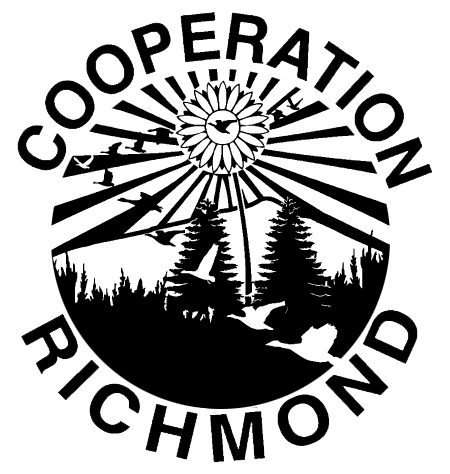COOPERATIVES
Cooperatives, affectionately known as “co-ops”, are powerful economic tools and a means for personal and community transformation.
Being cooperative is a way of life.
A Cooperative, with a capital “C”, can be a California corporate status and a type of business model for groups of people (small to large groups) working together to meet their own community needs for work, food, housing, energy, learning, recreation and more …
Co-ops are typically organized as businesses governed by the workers/members and operate to serve actual community needs. When co-ops generate surplus (profits), the workers/members determine how the surplus (profits) will be used and distributed.
♥️ Worker Co-ops
Worker co-ops are businesses that are owned, governed, and operated by their workers. Effective co-ops depend on the active participation of each member, valuing each members unique & skillful contributions to the business.
-
Worker cooperatives are designed to be accessible and inclusive, with low financial barriers to entry. The "buy-in" or membership fee is decided by the worker-members of the cooperative. To ease financial burdens, co-ops often accept installment payments or offer "sweat equity" options, where members can work off their membership fee.
-
As part of the Seed Commons community wealth cooperative, we pool financial resources and lend to worker co-ops in and around Richmond. Our aim is to lower funding barriers for local cooperatives. We enhance our lending with direct business support and cooperative mentorship.
-
Any business existing to fulfill actual community needs can be a cooperative. This gives your team the creatively freedom to create products or services that uniquely cater to the needs of the local people and place.
Cooperative Principles
-
Cooperatives are businesses and organizations formed to meet their communities shared needs. Co-ops are open to all people willing to accept the co-ops responsibilities and work together to create the goods and services the community wants and needs.
-
Co-ops are guided by their members shared vision, values, and goals. Members collectively determine the rules and boundaries of the co-op as outlined in the co-op’s bylaws. Co-op members set the pace, create the policies and manage the daily operations of the cooperative business.
-
Joining a co-op involves paying an initial membership fee, also called a "buy-in." Members can sometimes cover this fee all-at-once or in installments or worked off ~ also known as "sweat equity".
A co-op’s buy-in amount differs from business to business. The funds may help pay for essential equipment and space. The buy-in also represents a member's commitment to the co-op's future.
-
Members collectively control the cooperative, focusing on self-determination and unity to meet shared needs. They carefully choose partnerships and funding to maintain their autonomy, always prioritizing the interests of the members and the community in their decisions and resource distribution.
-
Cooperatives require ongoing education and training for all members and even collaborators to ensure that everyone has the capacity and skills to manage the co-op. Cooperatives also educate the public about the local and global benefits of cooperation.
-
Cooperatives grow with aligned collaborations; pooling labor and other resources to meet its community needs. This includes sourcing and trading with other cooperatives and complimentary businesses. This can also look like skill sharing and other mutual-aid activities.
-
Above all, cooperatives prioritize their members' and community care and needs. They practice their agreements and engage in ways that enhance community well-being.
Co-op Values
-
Self-determination is expressing our inner power to determine our own destiny.
-
At the heart of cooperatives lies solidarity in unity. We are transformed through our collective power.
-
The struggle to overcome oppression is layered and complex. Core to our co-op development work is actively addressing all forms of oppression that we encounter.
-
Cooperatives are about mutual benefit, which is at the heart of mutual-aid. We support one another in times of need.
-
Cooperatives give power back to the people – the workers and the community. We organize our power to fully control our collective work.
-
Co-ops work to generate and sustain natural resources for future generations.


